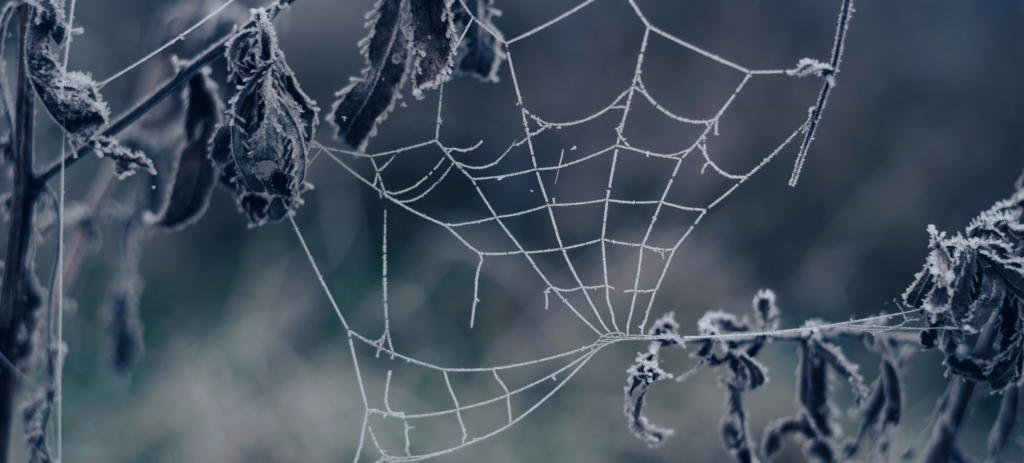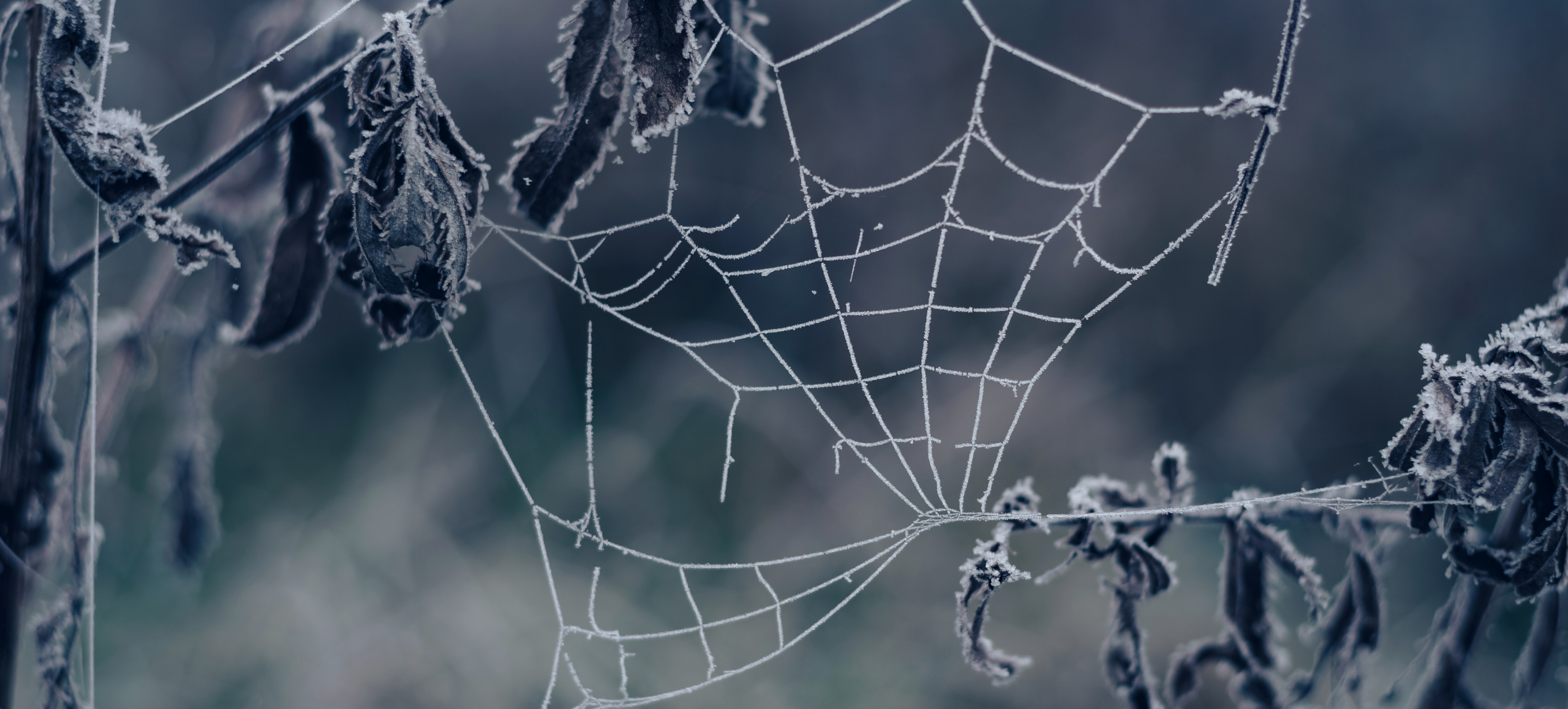By David Demchuk

CW: spiders, mild body horror
Our village is prosperous now, but it was not always so. When I was a child, we had as our mayor a kindly old man named Mr. Lubomyr. Every day from dawn until dusk he would run all around the town in a perpetual panic, watching helplessly as the villagers struggled with floods and fires and mishaps. For Mr. Lubomyr, as kind as he was, was afraid of absolutely everything—water and heights and dogs and cats and birds and bats and mice and rats, and of course the dark. In some ways he was a very good mayor: He was thoughtful, and generous, and compassionate. But his greatest fear was our undoing, and that was his fear of spiders.
Every spring, as the sun began to warm the village, he would issue an order to all of the farmers and townspeople that they must find and kill each and every spider on their property. The first to kill one hundred spiders would win a prize—a delicate wreath of spring grasses and flowers braided by the mayor’s charming young daughter, Malinka.
Dutifully we would scour our houses, our yards, and our fields, and we would kill every spider we found. It was a grim task, as the spiders were small and shy and had never bitten a person, not even a baby. But these were our orders and they came from the mayor himself. And so throughout my childhood, we dedicated one Sunday each spring to the killing of spiders, and then once again every fall as the few who survived tried to escape the cold by coming into our homes.
Within a few years, there were no spiders left, and Mr. Lubomyr was a very happy man. But then one spring and summer, our crops and orchards were beset with pests of all kinds, worms and weevils and ants and wasps, so that we struggled to keep our families and livestock alive. And then one of the children, the Kostiuk boy, younger than me, he fell ill with a strange spotted fever, as did his infant sister. Soon most of the children were terribly sick, and a few of the adults as well, with a disease that it seemed was spread by fleas.
Only one household was spared these trials—that of Mrs. Romaniuk on the outside edge of the village. Her crops and animals were fine and healthy, as were her children and grandchildren. She herself was old and deaf, and her family had few dealings with the village, except through the general store and also at harvest time. If she ever heard of the mayor’s orders, she never paid any mind to them, and neither did her family. And so her house and farm were overrun with spiders, who made a meal of all the pests that would otherwise have ruined their grains and produce and attacked their livestock. Many was the time that year that the other farmers and villagers called upon her family and asked for any food they could spare. The Romaniuks were generous with their neighbours, as they had more than they could eat themselves.
In this way, they kept the whole village alive, right up until Dozynki, the autumn harvest festival. It was then that the mayor saw for himself the empty bushel baskets, the emaciated animals, the children scarred and damaged by their illnesses.
“If you have nothing,” he asked in shock to the farmers gathered in the town square, “how did you survive? Where did you get your food?”
One after another, the farmers spoke up. “Old Mrs. Romaniuk, she is the one who fed us. She is the one who gave us meat, and potatoes, and turnips, and fruit, and flour, and corn.”
The mild and soft-spoken mayor was suddenly furious. “How is it that she has food for everyone while none of you can feed yourselves?”
The farmers and villagers dared not answer. They could only look at their feet in silence.
“Where is she? Where are the Romaniuks?”
The farmers pointed to the farthest stall, where Mrs. Romaniuk stood with her oldest son, Wasyl.
Mr. Lubomyr stormed over to the Romaniuks’ stall and saw for himself the bounty they had brought: fresh chickens and lambs, beets and cabbages and carrots, apples and berries and grains.
“This is witchcraft!” he shouted. “This is the devil’s work!”
Mrs. Romaniuk could barely hear the mayor, so Wasyl had to lean in and explain. She shrugged and shook her head. “I have done nothing special. It was a good year. A shame about the others.” She reached into one of her teeming bushel baskets and pulled out a juicy red apple. “Here,” she offered, “a gift from me to you.”
Mr. Lubomyr looked down at the apple and recoiled in horror as he saw perched upon it a tiny baby spider. He slapped the apple out of her hand and screamed. “The order! I gave everyone the order! Are you trying to kill me?”
He turned and shouted for Officer Rudniak, the chief constable of the village, and demanded that Mrs. Romaniuk and her family be removed from their property and sent away before nightfall.
Wasyl again leaned in and explained the mayor’s outburst. She nodded and a sly smile stretched across her lips. “We will leave, if that is what you wish,” she said. “But you will miss us soon enough.”
She told her son to fetch their horse and cart so they could hurry home and pack their belongings. Then she turned back to the mayor and the constable and the gathering farmers and villagers. “We will leave this food here for all of you. Take what you need with my blessings.” She gave a little nod, then turned and walked to where her son would meet her.
“Do not take it!” the mayor shouted. “Do not touch it! Burn the food, the table, the stall, burn all of it!”
Tears filled the eyes of the farmers and villagers as the constable took a torch to the stall full of food and they watched it burn into ash.
That night, after the Romaniuks had taken their belongings and ridden away, the constable and his men descended on their farm and set it afire as well: the house, the barn, the fields, and orchards. All of the Romaniuks’ spiders were killed, save for one—a wise old mother spider named Anoushka, who was perched on a stone on the shore of a pond on the very edge of the Romaniuk land. She, and the mayor, and the farmers, and the villagers, all watched the flames from a distance, as the first few flakes of winter floated down from a starless sky.
* * *
Three months later, as Christmas was nearing, the farmers and villagers were struggling to stay alive, but the mayor was sadly oblivious to their plight. His charming young daughter, Malinka, was ailing, you see, and he stayed with her day and night feeding her what little broth he could make from the few sad wrinkled potatoes he had in his cellar. He feared she might not live to see the holy day, and he was not the only father in the village to have such a fear.
Seven days before Christmas, Mr. Lubomyr awoke to the sounds of shouting outside his daughter’s window. He threw the curtains open in a rage, then he saw what they saw: One of the three tall pine trees at the front of his house was completely covered in glistening sliver, the frozen web of a spider—beautiful, elaborate, and forbidden. He clutched at his chest and let out a small scream. How was this possible? He ran down the stairs and out the front door and stood with the villagers, astonished and revolted at the web’s icy perfection. He raced into the house and back out with a torch he lit from the kitchen fire. Then he set the tree alight. The flames climbed up branch after branch, consuming the tree until only the charred blackened trunk remained. Suddenly his daughter let out a moan, and the mayor rushed back in the house to be at her side.
Three days before Christmas, Mr. Lubomyr once again awoke to the cries and shouts of the villagers outside his daughter’s window. He pulled the curtains wide and saw the second of the pines in front of his house was glittering and sparkling in the bright morning light, delicately veiled in yet another frozen web. The mayor clutched at his head and shrieked—how could this be? He ran down the stairs, lit another torch from the kitchen fire, and rushed out the door gibbering insensibly, then set the second tree alight. He and the villagers watched as the flames ascended till the tree had burned to a crisp. Two tall dead pine trees now stood side by side, like blackened claws reaching out of the frozen ground. Suddenly poor Malinka let out another terrible moan, and the mayor hurried back into the house, slamming the door behind him.
The day before Christmas, Mr. Lubomyr woke to shouts and screams that were louder than the first two mornings together. He knew even before he opened the curtains, but still he did and still he saw what everyone else in the village was staring at: The last surviving pine tree at the front of his house was shrouded in gleaming webs of ice like precious pearls and diamonds strung on the finest silver strands. None in the village, not even the mayor himself, had ever seen anything so exquisite. Driven to the very edge of madness, the mayor burst out of the house keening and wailing, brandishing his flaming torch, and hurled it at the final tree. Within moments, it was ablaze, and not long after that, it was a smoking smouldering ruin like the others. Once more, Malinka cried out in terrible pain, and the mayor scurried back into his house, certain that this would be the end of everything.
And it was.
For when the mayor awoke on Christmas Day, he found he could not move his arms, his legs, his hands, his feet, or his open mouth. He looked down at himself and saw he was completely encased in the web of a thousand spiders. He was paralyzed. He looked into the open door of poor Malinka’s bedroom—and gasped when he saw her on the floor, writhing in pain, her face and body oddly swollen, and she was struggling to crawl towards him.
Then the mayor looked down at his chest and screamed. For the wise old mother spider Anoushka was perched upon him, staring at him, and this is what she had to say:
“You have killed many in my family and you have tried to kill me, and your farmers and villagers and even your daughter have suffered for it. And yet you would not stop, even on the holiest days of the year. So now I have come to give you a very special gift, the most precious thing I have to give.”
With that, she turned to look at poor Malinka crawling across the floor, and with dread, the mayor watched her as well. Suddenly the skin on her hands and arms and face began to bubble and roil, and she flailed and clawed at herself, sobbing and shrieking. One eye burst—then the other—and out of their sockets poured dozens, hundreds, of tiny baby spiders. Then out of her ears, her nose, her mouth, swarms of them out of every orifice—
I repeat: out of every orifice—
—and they all came skittering across the floor, heading right towards him.
“My most precious gift,” Anoushka said. “My many many children. Merry Christmas, Mr. Lubomyr. I hope you enjoy them.”
Hundreds and thousands of tiny baby spiders crawled up onto the bed and over his body and onto his face and into his open mouth.
And that was the last we ever saw or heard of him. In all my many years, no one has ever gone into that house, and no one has ever come out.
Old Mrs. Romaniuk returned to the village with her sons, and her eldest became our mayor before the winter snows had passed. Our fields and orchards and livestock returned to full health, as did our children. And every year, to show our gratitude to Anoushka, we make spiderwebs of straw to hang from our ceilings and doorways, and we decorate our Christmas trees with tinsel to remind us of the webs she cast upon the three tall pines. We teach our sons and daughters that to find a spider web is the best of luck, and to always leave it untouched.
For Anoushka the Christmas spider is watching, and so are her
many
many
many
many
children.

David Demchuk has been writing for print, stage, digital, and other media for more than 40 years. His debut horror novel, The Bone Mother, published in 2017, was nominated for the Scotiabank Giller Prize, the Amazon Canada First Novel Award, the Toronto Book Award, the Kobzar Book Award, and a Shirley Jackson Award in the Best Novel category. It won the 2018 Sunburst Award in the Adult Fiction category. It was listed in the Globe and Mail’s and the National Post’s top books of the year and became a #1 bestseller on Amazon.ca. You can find him on Twitter @spo0ky_dad.
Why we chose this piece: We love this morbid little Christmas piece. David captures the “once upon a time” voice very well; it reads just like a bedtime story. The descent into horror is very effective. We were also delighted to learn about this (expanded) piece of folklore. The ending is perfect.






Mr. Demchuk’s redoing and expanding on a folktale, which I assume is Ukrainian, captures the reader by its apparent simplicity, it’s rejection of arbitrary rules by dictatorial leaders, its easy-going, calming pace, and its calling us back to our childhood days when we heard then read simple stories with life messages embedded. It also makes a hero of what is usually thought of as a frightful and disgusting creature. I enjoyed it.